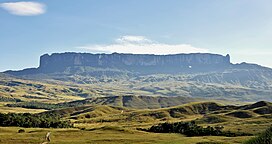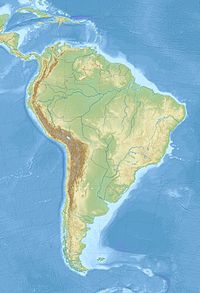| Mount Roraima | |
|---|---|
 Mount Roraima as seen from the Venezuelan side | |
| Highest point | |
| Elevation | 2,810 m (9,220 ft)[1] |
| Prominence | 2,338 m (7,671 ft)[1] |
| Listing | |
| Coordinates | 5°08′36″N 60°45′45″W / 5.14333°N 60.76250°W |
| Geography | |
| Location | Border region between Brazil (Roraima), Guyana (Cuyuni-Mazaruni) and Venezuela (Bolívar) |
| Countries | |
| Parent range | Pacaraima Mountains, Guayana Highlands |
| Geology | |
| Mountain type | Plateau |
| Climbing | |
| First ascent | 1884, led by Sir Everard im Thurn and accompanied by Harry Inniss Perkins and several natives[2][3]: 497 [a][b] |
| Easiest route | Hiking path |
Mount Roraima (Spanish: Monte Roraima; Tepuy Roraima; Cerro Roraima; Portuguese: Monte Roraima) is the highest of the Pacaraima chain of tepuis (table-top mountain) or plateaux in South America.[4]: 156 [c] It is located at the junction of Brazil, Guyana and Venezuela. A characteristic large flat-topped mountain surrounded by cliffs 400–1,000 m (1,300–3,300 ft) high. The highest point of Mount Roraima is located on the southern edge of the cliff at an elevation of 2,810 m (9,220 ft) in Venezuela,[d] and another protrusion at an elevation of 2,772 m (9,094 ft) at the junction of the three countries in the north of the plateau is the highest point in Guyana. The name Mount Roraima came from the native Pemon people. Roroi in the Pemon language means "blue-green", and ma means "great".[5]
Leaching caused by intense rainfall has shaped the peculiar topography of the summit, and the geographical isolation of Mount Roraima has made it home to much endemic flora and fauna. Western exploration of Mount Roraima did not begin until the 19th century, when it was first climbed by a British expedition in 1884. Yet despite subsequent expeditions, its flora and geology remain largely unknown. The privileged setting and relatively easy access and climbing conditions on the south side of the cliffs make Mount Roraima a popular destination for hikers.[6]
- ^ a b Cite error: The named reference
Peakbagger1was invoked but never defined (see the help page). - ^ a b Cite error: The named reference
NYTimes1was invoked but never defined (see the help page). - ^ a b Cite error: The named reference
ImThurn1was invoked but never defined (see the help page). - ^ a b Cite error: The named reference
Swan1was invoked but never defined (see the help page). - ^ "The meaning behind the name 'Mount Roraima'". Explorationjunkie.com. 7 December 2019. Retrieved 7 December 2019.
- ^ "Mount Roraima". Encyclopædia Britannica. Retrieved 2012-02-06.
Cite error: There are <ref group=lower-alpha> tags or {{efn}} templates on this page, but the references will not show without a {{reflist|group=lower-alpha}} template or {{notelist}} template (see the help page).



